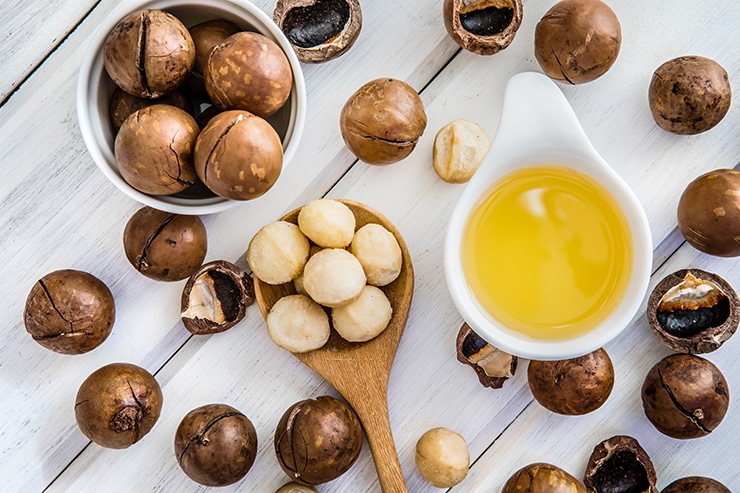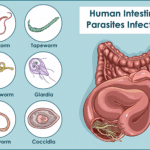Macadamia Nut Oil Is Better Than Extra Virgin Olive Oil

Stop cooking with olive oil
You may have heard that you should stay away from nut oils, because they bring in omega-6 instead of the more desirable omega-3 fatty acids. Macadamia nut oil is the clear exception to this rule.
Extra virgin olive oil is prized because it’s an omega-9 fatty acid. Well, macadamia nut oil is richer in omega-9 and it has a much higher smoke point, so it a better choice to cook with.
Macadamia nut oil is composed of mostly monounsaturated fatty acids (MUFAs) with oleic acid (omega-9) being the most abundant. Moreover, several studies have investigated the potential health benefits of macadamia nut oil.
A study published in the Journal of Food Science and Technology in 2016 found that consuming macadamia nut oil for eight weeks resulted in lower levels of total cholesterol, LDL-cholesterol, and triglycerides in healthy participants. Another study published in the Journal of Oleo Science in 2017 demonstrated that macadamia nut oil improved insulin sensitivity and reduced inflammation.
The beneficial effects of macadamia nut oil are not limited to its fatty acid composition. The oil also contains various antioxidants, such as tocopherols, that protect against oxidative damage to cells. Antioxidants have been shown to play a crucial role in preventing chronic diseases, such as cancer and cardiovascular disease, by neutralizing harmful free radicals that can damage cells.
Macadamia nut oil also contains phytosterols, which are compounds that have been found to lower cholesterol levels and improve cardiovascular health. A randomized, controlled study published in the Journal of the American College of Nutrition in 2014 found that consuming macadamia nuts for five weeks resulted in significantly lower levels of LDL-cholesterol in participants with high cholesterol levels.
Polyunsaturated fatty acids (PUFAs) are the least abundant fatty acids in macadamia nut oil, making up less than 5% of the total fatty acid content. However, the PUFAs in this oil are unique in that they are primarily composed of omega-7 and omega-9 fatty acids, rather than the more commonly known omega-3 and omega-6 fatty acids. This is one reason why this has a higher smoke point than olive oil.
When selecting macadamia nut oil, it is important to choose a high-quality product that has been cold-pressed and minimally processed. This will help to ensure that the oil retains its beneficial compounds and is free from harmful contaminants.
My best advice
Stop cooking with olive oil. The beauty of this oil is that the first pressing contains plant particles and these plant particles contain polyphenols and these offer us profound health benefits. They are also very sensitive to oxidation from light and heat (this is why you are supposed to tightly seal your olive oil in a dark bottle, in a cool dark place). Use extra virgin olive oil for cold use – drizzle over vegetable dishes after they are removed from the heat, or, use as a salad dressing.
Olive oil has a smoke point of 350° F. When you are cooking an average temperature of 350-375° F is reached cooking over medium heat. So, when you heat olive oil, you lose the antioxidants and polyphenol benefits and, if you go over 350° F, you will oxidize the oil.
Oxidizing the oil creates peroxides and aldehydes, that’re produced when the oil is exposed to oxygen. These compounds drive inflammation and oxidative stress, and they’ve been linked with cancer.
Cook with macadamia nut oil. Its smoke point is 410° F.
Macadamia nut oil is a healthy and flavorful alternative to other cooking oils. Its unique fatty acid composition, antioxidant content, and polyphenols make it a great choice for individuals who are looking to improve their health through dietary changes. The current evidence suggests that it has numerous positive effects on cardiovascular health, inflammation, and insulin sensitivity.
- USDA FoodData Central. Macadamia nuts, raw. Accessed on March 27, 2023 from https://fdc.nal.usda.gov/fdc-app.html#/food-details/173765/nutrients
- Kornsteiner M, Wagner KH, Elmadfa I. Tocopherols and total phenolics in 10 different nut types. Food Chem. 2006;98(2):381-7.
- Dreher ML, Davenport AJ. Hass avocado composition and potential health effects. Crit Rev Food Sci Nutr. 2013;53(7):738-50.
- Griel AE, Cao Y, Bagshaw DD, et al. A macadamia nut-rich diet reduces total and LDL-cholesterol in mildly hypercholesterolemic men and women. J Nutr. 2008;138(4):761-7.
- Conlon LE, King BM, Moran NE, Wiese TJ, et al. Macadamia nut consumption modulates favourably risk factors for coronary artery disease in hypercholesterolemic subjects. Lipids. 2012;47(8):799-806.
- Sabate J, Oda K, Ros E. Nut consumption and blood lipid levels: a pooled analysis of 25 intervention trials. Arch Intern Med. 2010;170(9):821-7.
- Tindall AM, Petersen KS, Lamport DJ, et al. Low-fat plant-based diet effects on body weight, lipid levels, and systemic inflammation in overweight adults: a randomized controlled trial. Nutrients. 2020;12(9):2631.
- Nishi SK, Kendall CW, Bazinet RP, Bashyam B, et al. Nut consumption, serum lipid and lipoprotein levels: a systematic review and meta-analysis. J Am Coll Nutr. 2020;1-18.
- Yaghmur A, Aserin A, Garti N. New insights into the phase behavior of edible oil systems: the case of macadamia nut oil. J Agric Food Chem. 2011;59(13):7215-25.
- Wanyonyi S, Du Preez R, Brown L, et al. The potential of macadamia nuts in the prevention of cardiovascular disease. Nutrients. 2017;9(3):E240.
- Wu W, Kang S, Zhang D. Association of nut consumption with risk of cardiovascular disease and all-cause mortality: a meta-analysis of prospective cohort studies. BMC Med. 2021;19(1):270.
- Chung SK, Osawa T, Kawakishi S. Hydroxyl radical-scavenging effects of spices and scavengers from brown mustard (Brassica nigra). Biosci Biotechnol Biochem. 1997;61(1):118-23.
- Li Z, Liu F, Zhang Q, et al. Macadamia nut oil supplementation attenuates inflammation and adiposity in obese rats. J Oleo Sci. 2017;66(4):377-84.
- Razak MA, Begum PS, Viswanath AN, et al. Multifarious beneficial effect of nonessential nutrient, nutraceutical, and phytochemical, macadamia oil against metabolic syndrome: a review. Oxid Med Cell Longev. 2018;2018:4346490.
- O’Brien RD. Fats and Oils: Formulating and Processing for Applications. 3rd ed. Boca Raton, FL: CRC Press; 2008.
- Garg ML, Blake RJ, Wills RB. Macadamia nut consumption lowers plasma total and LDL cholesterol levels in hypercholesterolemic men. J Nutr. 2003;133(4):1060-3.
- Zhang Y, Hu X, Liu C, et al. Antioxidant, anti-inflammatory and anticancer activities of macadamia nuts. Int J Mol Sci. 2018;19(3):689.
- Carbone JW, Pasiakos SM. Dietary protein and muscle mass: translating science to application and health benefit. Nutrients. 2019;11(5):E1136.
- Hosseini B, Berthon BS, Saedisomeolia A, et al. Effects of fruit and vegetable consumption on inflammatory biomarkers and immune cell populations: a systematic literature review and meta-analysis. Am J Clin Nutr. 2018;108(1):136-55.
- Magrone T, Jirillo E. The interplay between the gut microbiota and herbal medicines: implications for toxicity and drug interactions. J Clin Med. 2020;9(4):E1203.
- Ros E, Mataix J. Fatty acid composition of nuts-implications for cardiovascular health. Br J Nutr. 2006;96 Suppl 2:S29-35.
- Wijesundera C, Ceccarelli N, Thavarajah D, et al. Macadamia nuts (Macadamia integrifolia and M. tetraphylla): a review of their nutritional, phytochemical and therapeutic properties. Nutrients. 2021;13(2):E624.
- Li D, Zhang P, Guo W, et al. A systematic review and meta-analysis of nut consumption and incident risk of CVD and all-cause mortality. Public Health Nutr. 2018;21(17):3097-110.
- Griel AE, Kris-Etherton PM. Tree nuts and the lipid profile: a review of clinical studies. Br J Nutr. 2006;96 Suppl 2:S68-78.
- Alasalvar C, Shahidi F. Tree nuts: composition, phytochemicals, and health effects. Boca Raton, FL: CRC Press; 2008.
- Udani J, Hardy M, Madsen DC. Blocking carbohydrate absorption and weight loss: a clinical trial using Phase 2 brand proprietary fractionated white bean extract. Altern Med Rev. 2004;9(1):63-9.
- Kwon MJ, Song YJ, Lee YJ, et al. Chemical compositions and antioxidant activities of macadamia nut oils extracted from different origins. J Food Sci. 2015;80(4):C739-44.
- Sampaio GR, Saldanha LA, da Silva AG, et al. Impact of high levels of dietary macadamia oil on plasma and hepatic lipids in rats. Food Funct. 2015;6(5):1554-62.
- Kris-Etherton PM, Yu-Poth S, Sabate J, et al. Nuts and their bioactive constituents: effects on serum lipids and other factors that affect disease risk. Am J Clin Nutr. 1999;70(3 Suppl):504S-11S.
- Cassady BA, Hollis JH, Fulford AD, et al. Mastication of almonds: effects of lipid bioaccessibility, appetite, and hormone response. Am J Clin Nutr. 2009;89(3):794-800.
Enjoying this content? Sign up for updates... It's FREE!

















